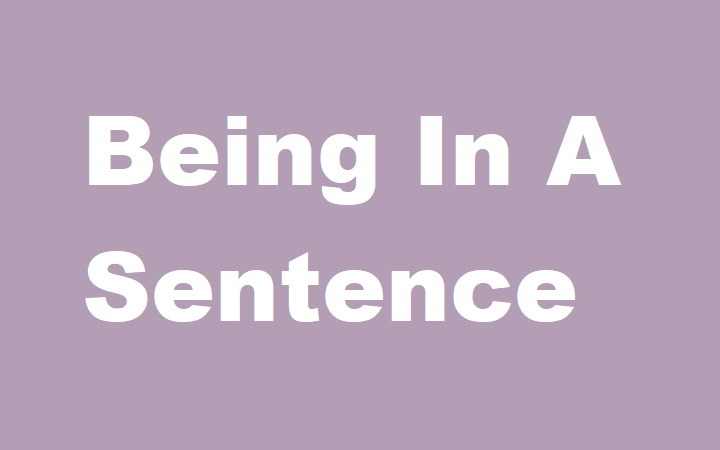Some words hold the power to describe existence itself. The word being is one of them. It can speak of life, identity, presence, or the state of doing something at a certain time. You’ll find it in literature, daily conversations, and professional writing. To understand being in a sentence is to understand a word that connects grammar with meaning and philosophy.
When you write, being can be a noun, a verb form, or even part of a phrase. You can say, “She is being kind.” Or you can say, “Every human being deserves respect.” Both are correct, but both demonstrate different uses. This tutorial will explain to you how to use being in a sentence, give you examples, and show you why this word is useful.
What Does Being Mean?
The word being has various uses depending on how it is used. It is a flexible word that can function in different ways.
As a Noun
It refers to a living thing or existence itself.
- Example: All beings on this earth need air to breathe.
- Example: She is a fine human being.
As a Verb (Present Participle of “Be”)
It describes continuing action or state.
- Example: He is being polite today.
- Example: The cat is being naughty.
As an Abstract Noun
It may represent existence or essence.
- Example: Philosophers often debate the meaning of being.
- Example: Her whole being was filled with joy.
How to Use Being in a Sentence
The grammar is simple. Think of it as a helper that connects states and actions.
Basic Structure
Subject + verb + being + complement.
Examples:
- She is being helpful.
- The dog is being loud.
- I am being careful.
As a Noun in Sentences
- He is a mysterious being.
- Every human being deserves love.
- The beings in the story had magical powers.
As a Philosophical Word
- Being is at the center of existence.
- Her being radiates kindness.
Everyday Examples of Being
Here are examples that you can use in everyday life.
- She is being honest with you.
- The child is being noisy in class.
- He thanked every being who helped him.
- Being on time is the key to success.
- The actor is receiving accolades for his role.
- A human can hate and love.
These examples show how natural being is in English.
Why Use Being over Other Words
Some will ask, “Why not use is or existence?” The reason is versatility.
- Being imparts subtlety. “She is being kind” doesn’t mean the same as “She is kind.” The first suggests temporary behavior, the second a permanent trait.
- It expresses identity. Human beings sound more vibrant than humans.
- It is full of philosophy. Being is not just life; it is existence.
Synonyms and Related Words
Being does have language relatives, but they are not identical.
- Existence: The existence of stars fascinates scientists.
- Creature: The forest was full of strange creatures.
- Entity: The company is a legal entity.
- Life: All life is valuable.
Nevertheless, being is the most versatile because it fits both grammar and philosophy.
Being in Literature and Speech
Writers, poets, and speakers love being. It gives weight to sentences.
- Shakespeare used it: “To be, or not to be…” at its essence is being.
- Poets write: “Her being was light itself.”
- Politicians speak of being one as a nation.
- Philosophers debate the meaning of being.
It is everywhere—art, speeches, conversation.
Being in Everyday Life
At school, at work, and at home, being is present.
At School
- The child was being helpful, the teacher remarked.
- She wrote an essay on human beings.
At Work
- He is being groomed for leadership.
- The manager is being firm about deadlines.
At Home
- The puppy is being cute today.
- My little brother is being too noisy.
It naturally occurs in speech.
Idioms and Fixed Phrases with Being
Some phrases have being as a key word.
- For the time being → temporarily
- Human being → a person
- Well-being → happiness or state of health
- Being there → presence
Examples:
- For the time being, we’ll wait here.
- Every human being has the right to be respected.
- Exercise is wonderful for your well-being.
- Thank you for being there when I needed you.
Most Common Mistakes with Being
Writers sometimes use being incorrectly. Below are the pitfalls.
- Using it when it is not needed
- Wrong: He is being has a car.
- Correct: He has a car.
- Wrong: He is being has a car.
- Mixing tense forms
- Wrong: She was being goes to school.
- Correct: She was going to school.
- Wrong: She was being goes to school.
- Using it too much in formal writing
- Instead of repeating being, use synonyms where you need to.
- Instead of repeating being, use synonyms where you need to.
Professional Use of Being
The word is not just informal—it has a use in professional environments too.
In Business
- New systems are being trained on by employees.
- The client is being updated regularly.
In Education
- Exams are being studied for by students.
- The health of students is looked after by the school.
In Health
- The outbreak is being closely monitored by physicians.
- Well-being programs are part of healthcare.
Emotional Power of Being
Words carry emotion. Being carries the ability to inspire people.
- She is his whole being.
- He invested his being in the music.
- Losing a pet shakes your being.
It reaches the heart of identity and feeling.
Practice Sentences with Being
Practice makes perfect.
Easy Examples
- He is being kind.
- She is being rude.
- They are being useful.
Intermediate
- She is being recognized for her hard work.
- The team is being commended for their effort.
- Being honest is the best policy.
Advanced
- The philosopher examined the nature of being.
- Being prepared enhances the possibility of success.
- Her whole being shone with happiness.
Beyond Reality: Philosophical Being
Philosophy cannot avoid being. Thinkers such as Heidegger and Sartre put it in the middle.
- Being is the essence of existence.
- Human beings are free and choosing agents.
- The philosophy of being is ontology.
Examples:
- The philosopher wrote a book about man’s being.
- Being establishes our place in the universe.
Cultural and Global Significance
Across cultures, being is present in proverbs, songs, and sayings.
- Proverb: “Well-being is better than wealth.”
- Song: “Thank you for being a friend.”
- Saying: “For the time being.”
It is universal. Every culture values being.
Why Being Still Matters
Being is not just a word. It is life, existence, action. In grammar, it forms sentences. In philosophy, it forms meaning. In ordinary conversation, it portrays behavior.
When you use being in a sentence, you connect grammar and identity. You talk about what someone is doing, who someone is, or what existence is like.
Expanded Story Sentences
Sometimes longer sentences bring out the profundities of being.
- She whispered to her child, “You are the most precious human being to me.”
- The leader said, “The happiness of our country depends on unity.”
- The poet wrote, “To be alive is the greatest present.”
- He confessed, “Thank you for being patient with me.”
- The diary wrote, “My entire being belongs to this love.”
Each one shows depth.
FAQs on Being in a Sentence
What does being in a sentence mean?
It may mean existence, a living thing, or the present participle of the verb be.
Can being be formal?
Yes. Example: The workers are being trained for safety.
What are the common expressions with being?
For the time being, human being, well-being, being there.
Is being a noun or a verb?
It can be both. As a verb: She is being kind. As a noun: human being.
Can being be metaphorical?
Yes. Example: Her whole being was filled with joy.
Being is an existential term. It establishes presence, state, and identity. It can be casual in a class, formal in a meeting, or deep in philosophy. When you use being in a sentence, you’re not only constructing grammar—you’re reflecting life itself.
Say: “She is being kind.”
Say: “He is a good human being.”
Say: “Well-being is wealth.”
Every time you use it, you’re making meaning. Being is a word plus. It exists in action.


